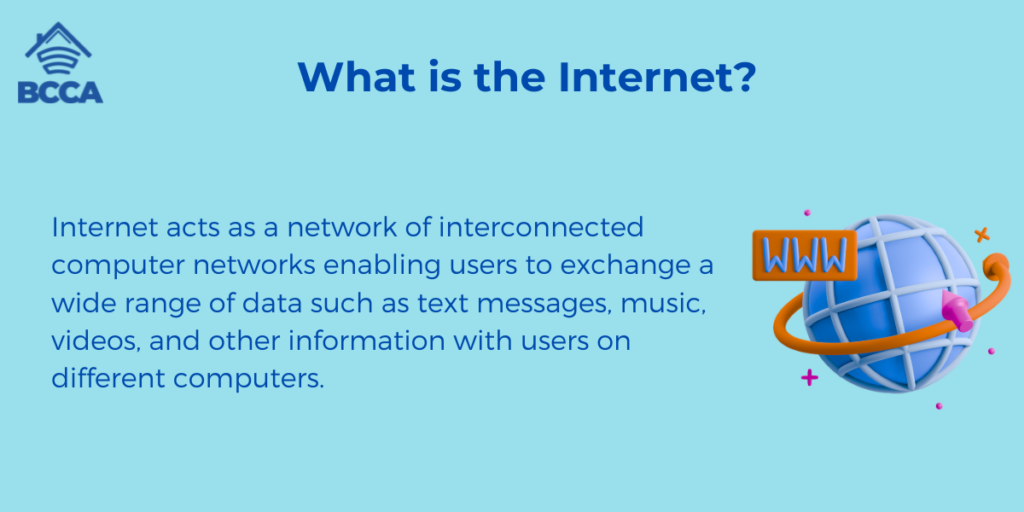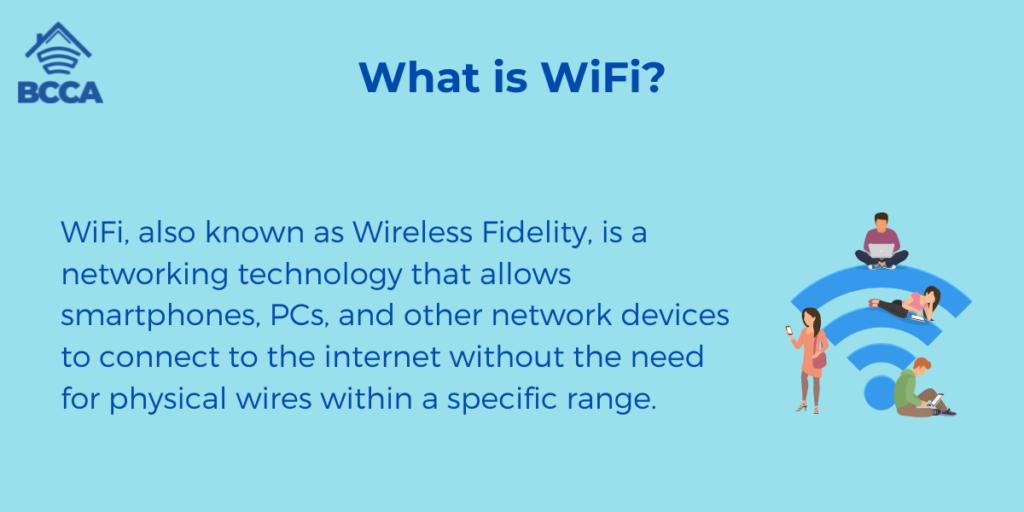Since we started using smart devices, the terms WiFi and the Internet have often been used interchangeably. Are they really different? The answer is actually yes!
WiFi technology has become incredibly popular and is available everywhere nowadays. You’ll likely find a WiFi hotspot nearby, whether grabbing a cup of coffee, shopping for clothes, or having a fun family movie night. You may hear people talking about “getting on WiFi” or being unable to “connect to WiFi”.
Usually, what they mean is that they can’t get their laptop, smartphone, or other devices connected to the internet.
The Internet, on the other hand, is a system that enables one device to send and receive data or information from another device using the Internet Protocol. In contrast, WiFi provides internet access for laptops, smartphones, PCs, and other devices within a range.
This article aims to clarify the distinction between WiFi and the Internet. Understanding these concepts can be helpful in troubleshooting connectivity issues at home. Let’s dive in!
Table of Contents
What is the Internet?

The Internet has become a part of our lives and is accessible everywhere we go. It acts as a network of interconnected computer networks enabling users to exchange a wide range of data such as text messages, music, videos, and other information with users on different computers.
Initially emerging as a medium for exchanging information in the 1990s, the Internet has gradually transformed into a phenomenon. Technological advancements have made it incredibly versatile over time. Today, it spans the globe as a web network known as WAN (Wide Area Network).
Every individual network on the internet is designed according to its needs. However, to interact effectively, all networks must adhere to rules and standard regulations. These rules and regulations collectively form what is commonly referred to as the Internet protocol.
When people open a browser on their smartphone or computer and navigate through websites upon request or visit search engine pages like Google, they are essentially interacting over the Internet.
Within the realm of WiFi vs. Internet comparison, there are types of servers that ensure the functioning of email services, various chat platforms and instant messengers, file storage facilities, and other essential online services.
In a couple of years, the speed of internet connections typically ranged from 2Mbps to 100Mbps. However, these speeds have increased significantly, ranging from around 100Mbps to support Gigabit speeds of up to 1000Mbps or even faster.
However, internet speeds sometimes tend to be slower over a WiFi network.
What is WiFi?

WiFi, also known as Wireless Fidelity, is a networking technology that allows smartphones, PCs, and other network devices to connect to the internet without the need for physical wires within a specific range.
Wirelessly accessing the internet enables users to check emails browse their websites, use networking sites, and exchange chat messages at their convenience.
A hotspot is an area where users can access the internet using WiFi without any restrictions.
The coverage of a WiFi network can extend up to 100 meters in distance; however, it is more common for it to have limitations ranging from 10 to 35 meters. The actual range and speed of internet connectivity depend on factors such as device power and environmental conditions (including walls).
The main advantage of using WiFi is its nature. You no longer need cables to move your laptop or PC around your house. Moreover, every family member can access the web on their smartphones through WiFi instead of relying on mobile data plans with higher costs.
You need to connect your router to an Internet source like a broadband modem using the WAN port to make your home WiFi network function as the Internet.
Once this connection is established, any device connected to the network can access the Internet through the WiFi signal.
Key Distinctions Between WiFi and the Internet
While we often use these terms interchangeably, it’s important to note that being connected to WiFi doesn’t necessarily mean being connected to the Internet.
WiFi functions as a network within a specific range, usually spanning 50 and 100 meters from a single router. On the other hand, the mobile Internet, such as 3G or 4G can cover kilometers or even tens of kilometers from each base station. Wherever there is a mobile connection available, we would be able to access the Internet.
The Internet serves as a network that enables us to access web pages worldwide using the TCP/IP protocol.
WiFi technology, also known as Wireless Fidelity, allows users to connect to networks without any connections.
To sum up, WiFi is a gateway that facilitates our connection to the Internet.
1. Meaning
WiFi is a technology that enables computers, smartphones, and similar devices with built-in WiFi capability to connect to the internet wirelessly or communicate with each other. Nowadays, most devices support WiFi for internet access and resource sharing while on the move.
On the other hand, the Internet functions as a language and self-sustaining infrastructure that connects millions of computers worldwide through various methods such as wireless connections, cables, satellites, and telephone lines. It serves as an interconnected network system facilitating the exchange of information throughout the internet structure.
2. Technology
WiFi relies on radio waves to transmit and receive signals between devices to provide internet connectivity. It operates as a networking protocol enabling cable communication between devices.
While WiFi is often used interchangeably with “wireless ” its scope extends beyond wireless connectivity. In contrast, the Internet serves as a telecommunication network using the Internet Protocol Suite (TCP/IP) for interconnecting devices.
The Internet enables users to connect to data or information stored on computers using the TCP/IP protocol. On the other hand, WiFi allows users to connect to the internet.
3. Functionality
While WiFi is commonly used to transmit and receive data using radiofrequency waves within a network, the internet, on the other hand operates by utilizing a set of predefined rules governed by the TCP/IP suite. These protocols serve as a shared language that enables devices to understand and exchange data.
4. Reliability
By using WiFi and a router, devices can communicate with each other without an internet connection. For instance, a printer with WiFi capabilities can print documents without relying on the Internet.
WiFi can be thought of as a router that allows mobile devices to connect and communicate with each other within a WiFi network independently of the Internet. Similarly, the internet only partially relies on WiFi for computer connectivity.
It implies that while you can connect to WiFi, it doesn’t necessarily guarantee access to the internet. The Internet is a medium for connecting millions of computers through the World Wide Web, simply known as “the Web.”
Frequently Asked Questions
The Internet is a network that enables users to access websites worldwide using the TCP/IP protocol. On the other hand, WiFi, which stands for Wireless Fidelity, allows users to connect to a network without any wires. Therefore, WiFi serves as a gateway for connecting to the Internet.
The Internet functions as a network that facilitates the exchange of information and data. It does not solely depend on WiFi for establishing connections with computers. In fact, internet access can be provided through various types of servers such as mail servers, file servers, application servers, and more.
WiFi network operates within a range of 50 to 100 meters from one router. On the other hand, mobile internet relies on 3G or 4G technology. It works over several kilometers or even tens of kilometers from each base station. In simple terms, mobile internet is available wherever there is internet coverage.
Having internet access doesn’t always guarantee faster internet speeds. It’s because the internet is essentially a community where the performance depends on the collaboration between the two entities.
When downloading a file from a server or computer with an internet connection, completing the download process will take quite some time. There’s not much you can do about it.
The Bottom Line
To sum it up, the Internet is a network consisting of interconnected computer networks worldwide. These networks are linked through cables, wireless connections, telephone lines, and satellites. They all use a language called the Internet Protocol Suite to communicate.
WiFi is a method of wirelessly connecting to the internet. It’s a networking technology that uses radiofrequency waves to facilitate communication between devices within a certain range.
In short, WiFi serves as a way to connect your laptop, tablet, smartphone, or any device with a built-in adapter to access the internet. Although users often use these terms interchangeably without distinction, it’s important to understand that they differ significantly from each other in every aspect.
Chris loves technology, specifically smart home technology! With both hands-on and executive leadership experience in his corporate career, Chris stays abreast of emerging technology and solutions and immerses himself in BCCA when not in the office.
